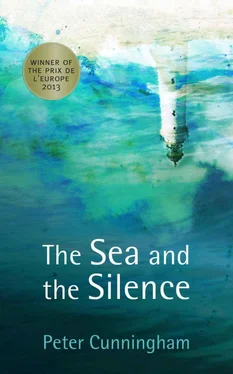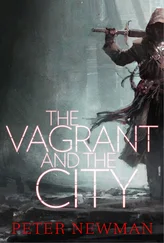‘After the war,’ I remember saying to him. ‘The whole world is waiting until after the war.’
We had supper with Mother and, when she went to bed, sat either side of the fire as the silence of the great house in the vast reaches of the echoingly empty countryside seemed to vibrate. I told him about the problems we were having with local land agitators and how only Allan could save Longstead from the Land Commission. Frank was silent for such a long time that I began to wonder if he’d heard what I had said.
‘I sometimes think there is no answer,’ he said eventually.
A log fell out on the hearth and he picked it with the tongs and put it back in place.
‘I know people whose minds are filled with nothing but destruction. It’s as if they want to erase the past. You can’t talk to them. They won’t change,’ he said.
‘So there is no hope,’ I said.
‘Sometimes I think the only hope is to get out of Ireland. To get as far away as possible and to love my country from a distance.’
I didn’t tell him then how I had often felt the same, but as I saw him into Allan’s room that night, then went to my own and got into bed, I was lifted up by this great vision of us together somewhere far away, our hearts filled with love and our backs turned forever on destruction.
Those were the soaring days. I can tell you that I had never lived before then, nor known my own soul. Frank came up from Monument to Meath almost every weekend, or if he didn’t, it was because the train to Dublin had been cancelled due to lack of fuel. I got John Rafter to teach me to drive our car so that I could collect him from Kildare station, or if the guards were out, scrutinising the roads for cars not entitled to burn precious fuel, I would meet him at a pre-arranged point between Longstead and Kildare and he would load his bicycle into the car and we would drive home. One Saturday morning, John Rafter drove up to see if we wanted anything brought to or collected from Dublin. Five minutes later, Frank and I were in the van with him, heading east.
After that, Dublin, less than an hour’s drive, was where we most often met. Frank took the train directly and I made my way into the city by means of a lift or the erratic bus service. Mother adapted without demur to our relationship and began to look forward to Frank’s visits to Longstead. He was a very good listener; she told him tales from her Yorkshire childhood that I had never heard before.
I came to regard Dublin — its grey streets, its newspaper vendors and ponds of ducks and grimed statues — with the utmost affection, for my baptism of love took place among them all. We walked through Saint Stephen’s Green, arm in arm, or by the Liffey bridges, or sometimes took a tram to Sandymount and walked its vast beach, so far out on occasions that I wondered would we ever make it back to shore. I didn’t care. I sensed that I sailed rather than strolled, that the whole world, hitherto a place of mystery and problems, was embellished richly for my benefit. Each night, I took the bus, or, if I was lucky, a lift home, and Frank either came with me or went back directly to Monument.
As the warm days of May came in, we took picnics down to the woods in Longstead, and lay there on carpets of bluebells. One day, we went for a spin with Mother in her pony-drawn trap, out the gates of Longstead, through Tirmon and in a loop towards the village of Grange. It was a day of endless promise, the grass banks of the narrow roads shining with primroses and the air rich with their scent. Peace lay on the land like a warm, caring hand.
‘Shall we call in on the Penroses?’ Mother asked as we approached Grange and the walls of Mount Penrose came into view.
‘I don’t think this would be a good time, Mother,’ I said.
‘Stanley Penrose is one of the best landlords in Ireland,’ Mother said to Frank.
‘Then maybe we should go in and burn the place to the ground,’ said Frank and nudged me.
‘Are you a revolutionary?’ Mother asked.
‘Not really,’ he said. ‘I just know one or two.’
‘I adore revolution,’ Mother said. ‘It must be so exciting!’
‘Well, we’re not going to burn Mount Penrose today, Mother, just to amuse you,’ I said.
‘It is completely panelled in oak,’ Mother observed, as we made our way home.
In Longstead that evening I told Frank about Norman Penrose and how my family’s greatest wish was that I would marry him.
‘Maybe your family is right,’ he said.
‘I would die,’ I replied.
‘There’s a lot to be said for security,’ Frank said. ‘For an assured future.’
‘Look at me,’ I said, and he did. ‘I would die,’ I repeated, and neither of us smiled.
The following weekend we met in Dublin and took a tram out as far as Howth. In warm heather, as yachts like toys glided at our feet, we kissed with a new urgency. And when we got back to Dublin, we went not to the place where the bus left from, but to a hotel called The Wicklow. In the back bar, we drank whiskies, then each of us went, at three minute intervals, up the curving stairs to the bedroom Frank had reserved.
It was that night that I first felt the all-possessing thrill of love. I felt as if my body had been turned inside out. I wanted to keep the moment for all time, indissoluble.
‘Was it bad?’ he asked afterwards.
I rolled into him. ‘They say for girls who’ve ridden horses it’s easier.’
‘I might have known,’ he said.
Bella came home in May with a man in tow. In his mid-thirties, tall and cool, he was called Nick Sinclair and worked in London in some ministry or other, a family tradition, I gathered. He had never been to Ireland before.
‘Iz is the backbone of Longstead,’ Bella told him.
She was radiant and Nick Sinclair could not drag his eyes from her.
‘Wonderful old place,’ he said.
‘What’s the latest from Rafter?’ Bella enquired.
‘His son still says that the Land Commission will hold off until the end of this year’, I replied. To Nick I said, ‘We all hope that the war will end and our brother Allan will come home.’
Bella described for Nick how Longstead was in peril.
‘They just take it?’
‘They pay for it with pieces of worthless paper called land bonds. So yes, in effect, they take it,’ I said.
‘Nick says we may not have to wait too long for the war to end, don’t you, darling?’
Nick smiled thinly. ‘Hopefully.’
‘Nick knows but cannot say,’ Bella said.
After supper, Bella announced that she and Nick were to be married. Mother seemed pleased in a glassy-eyed sort of way. I went to the kitchen and found a bottle of the champagne left over from Bella’s party. We sat and drank as Bella described how she adored life in London and Nick made commitments to become better acquainted with Ireland.
‘Is there another bottle of fizz?’ Bella asked.
‘Another?’
‘I just want to make sure there’s one here when you announce your news,’ said Bella.
I laughed her off. ‘I have no news.’
She turned to Nick. ‘There’s this wonderful man who is completely infatuated with our Iz.’
‘I’m not surprised,’ said Nick.
‘You mean, Frank?’ Mother said.
Bella’s face went into spasm. ‘ Who did you say?’
‘Frank,’ Mother said, with no idea of the consternation she was causing. ‘That lovely young man from Monument. He is quite the connoisseur of art. He very much admires my birds.’
Bella put down her glass. ‘Are we talking of the dock worker? I don’t believe this. ‘
‘Frank believes in a united Ireland,’ said Mother, ‘and I agree with him.’
‘Oh my God!’ cried Bella and closed her eyes. She turned to Nick. ‘The man I was actually referring to is Norman Penrose. He has taken over the running of our farm and transformed it. His uncle is Sir Charles Penrose.’
Читать дальше












![Edward Ellis - Adrift on the Pacific - A Boys [sic] Story of the Sea and its Perils](/books/753342/edward-ellis-adrift-on-the-pacific-a-boys-sic-s-thumb.webp)